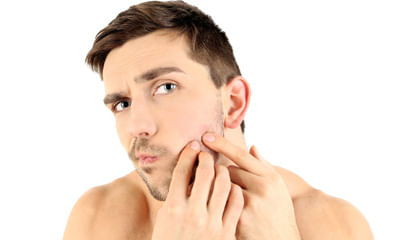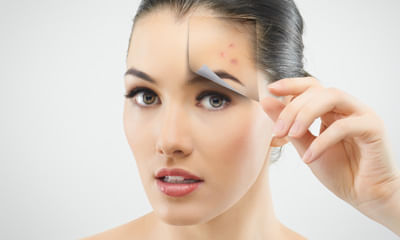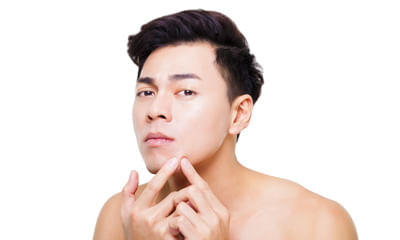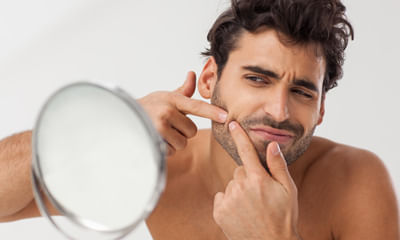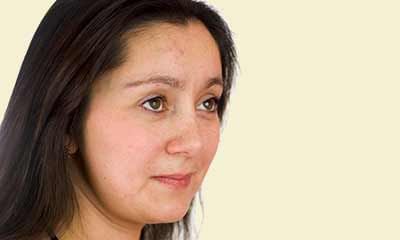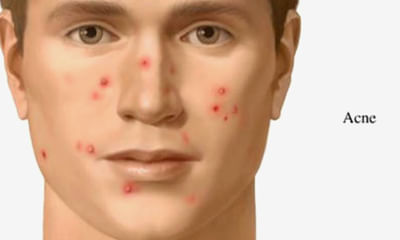Under The Skin Pimples On Forehead
I have fungal acne on my forehead and doctor gave me clobetasone butyrate and miconazole nitrate cream ,it was working g ...
Ask Free Question
treatment depends on the grade...Acne or pimples... Due to hormonal changes..Oily skin causes it...Common in adolescent age...May occur in adults also.. Food like Oily foods, ice cream, chocolate and sweets increase it.. Treatment depends on the grade of pimples or acne..So, please send photos by direct online consultation as it's a must to see which grade of pimples or acne for accurate diagnosis and treatment.
Can I apply noskurf lotion on my forehead slightly? Because I have pimples on my forehead can I apply there? Please kind ...
Ask Free Question
It is not to be used on face. Pimples, also known as acne, are primarily caused by a combination of factors involving the skin's oil glands, hair follicles, bacteria, and hormonal changes. Here are some of the common causes of pimples: 1. Excessive sebum production: sebum is an oily substance produced by the sebaceous glands in the skin. When the sebaceous glands produce too much sebum, it can clog the hair follicles, leading to the formation of pimples. 2. Clogged pores: the hair follicles or pores can become clogged with dead skin cells, dirt, and other debris. When this happens, it creates an environment where bacteria can thrive, causing inflammation and resulting in pimples. 3. Bacterial activity: the skin is home to bacteria, including propionibacterium acnes (p. Acnes). This bacterium feeds on the sebum produced by the skin and can multiply rapidly in clogged hair follicles, leading to inflammation and the formation of pimples. 4. Hormonal changes: hormonal fluctuations, particularly during puberty, menstruation, pregnancy, and menopause, can increase sebum production and alter the normal functioning of the skin. This hormonal imbalance can contribute to the development of pimples. 5. Diet: while the relationship between diet and acne is not fully understood, some studies suggest that certain foods, such as high-glycemic-index carbohydrates and dairy products, may worsen acne in susceptible individuals. However, more research is needed to establish definitive links. 6. Stress: stress can aggravate acne or contribute to its development. High-stress levels may increase inflammation in the body, leading to acne flare-ups. 7. Medications: some medications, such as corticosteroids, androgenic steroids, and certain anticonvulsants, may cause acne as a side effect. 8. Cosmetic products: certain makeup, skincare products, and hair styling products that are comedogenic (tend to clog pores) can contribute to the development of pimples. It's important to note that the causes and severity of acne can vary from person to person, and treating acne effectively often requires a tailored approach based on individual factors. If you're experiencing persistent or severe acne, it's advisable to consult a dermatologist for proper diagnosis and treatment.
I have dry skin, because of my menstrual problems I started getting mild acne, bumps on forehead, blackheads on cheeks a ...
Ask Free Question
If that doesn't work please follow these herbal combination for complete cure sootshekhar ras 1 tablet twice a day chandanadi avleh 10 gms twice a day.
I am currently 25 years old, lately, I have been experiencing acne breakouts around my nose which I suspect is because o ...
Ask Free Question
Pimples, also known as acne, are primarily caused by a combination of factors involving the skin's oil glands, hair follicles, bacteria, and hormonal changes. Here are some of the common causes of pimples: 1. Excessive sebum production: sebum is an oily substance produced by the sebaceous glands in the skin. When the sebaceous glands produce too much sebum, it can clog the hair follicles, leading to the formation of pimples. 2. Clogged pores: the hair follicles or pores can become clogged with dead skin cells, dirt, and other debris. When this happens, it creates an environment where bacteria can thrive, causing inflammation and resulting in pimples. 3. Bacterial activity: the skin is home to bacteria, including propionibacterium acnes (p. Acnes). This bacterium feeds on the sebum produced by the skin and can multiply rapidly in clogged hair follicles, leading to inflammation and the formation of pimples. 4. Hormonal changes: hormonal fluctuations, particularly during puberty, menstruation, pregnancy, and menopause, can increase sebum production and alter the normal functioning of the skin. This hormonal imbalance can contribute to the development of pimples. 5. Diet: while the relationship between diet and acne is not fully understood, some studies suggest that certain foods, such as high-glycemic-index carbohydrates and dairy products, may worsen acne in susceptible individuals. However, more research is needed to establish definitive links. 6. Stress: stress can aggravate acne or contribute to its development. High-stress levels may increase inflammation in the body, leading to acne flare-ups. 7. Medications: some medications, such as corticosteroids, androgenic steroids, and certain anticonvulsants, may cause acne as a side effect. 8. Cosmetic products: certain makeup, skincare products, and hair styling products that are comedogenic (tend to clog pores) can contribute to the development of pimples. It's important to note that the causes and severity of acne can vary from person to person, and treating acne effectively often requires a tailored approach based on individual factors. If you're experiencing persistent or severe acne, it's advisable to consult a dermatologist for proper diagnosis and treatment.
I have oily skin so basically I have an oily face so due to acne and pimples I have open pores in my both cheeks and in ...
Ask Free Question
Pimples, also known as acne, are primarily caused by a combination of factors involving the skin's oil glands, hair follicles, bacteria, and hormonal changes. Here are some of the common causes of pimples: 1. Excessive sebum production: sebum is an oily substance produced by the sebaceous glands in the skin. When the sebaceous glands produce too much sebum, it can clog the hair follicles, leading to the formation of pimples. 2. Clogged pores: the hair follicles or pores can become clogged with dead skin cells, dirt, and other debris. When this happens, it creates an environment where bacteria can thrive, causing inflammation and resulting in pimples. 3. Bacterial activity: the skin is home to bacteria, including propionibacterium acnes (p. Acnes). This bacterium feeds on the sebum produced by the skin and can multiply rapidly in clogged hair follicles, leading to inflammation and the formation of pimples. 4. Hormonal changes: hormonal fluctuations, particularly during puberty, menstruation, pregnancy, and menopause, can increase sebum production and alter the normal functioning of the skin. This hormonal imbalance can contribute to the development of pimples. 5. Diet: while the relationship between diet and acne is not fully understood, some studies suggest that certain foods, such as high-glycemic-index carbohydrates and dairy products, may worsen acne in susceptible individuals. However, more research is needed to establish definitive links. 6. Stress: stress can aggravate acne or contribute to its development. High-stress levels may increase inflammation in the body, leading to acne flare-ups. 7. Medications: some medications, such as corticosteroids, androgenic steroids, and certain anticonvulsants, may cause acne as a side effect. 8. Cosmetic products: certain makeup, skincare products, and hair styling products that are comedogenic (tend to clog pores) can contribute to the development of pimples. It's important to note that the causes and severity of acne can vary from person to person, and treating acne effectively often requires a tailored approach based on individual factors. If you're experiencing persistent or severe acne, it's advisable to consult a dermatologist for proper diagnosis and treatment.
I'm 19 years old and had acne, blackheads, acne scars, an oily skin and recently I noticed some fine lines on my forehea ...
Ask Free Question
These are all photoaging signs, you need to add sunscreen in your routine and for other signs consult plastic surgeon for further diagnosis and treatment.
I have hyperpigmentation on my forehead for the last 3 years. I have used a lot of cream (recommended by dermatologist) ...
Ask Free Question
Dear lybrate-user, treatment depends upon the severity or depth of pigmentation so best cream cannot be suggested based on description here. However, I am answering a particular question of yours. Kojivit ultra has safe ingredients. It can be used at night. Do not forget to apply sunscreen.
I had many average cyst like acne on my forehead and on my cheek which minimized by using clindamycin acne gel prescribe ...
Ask Free Question
treatment depends on the grade...Acne or pimples... Due to hormonal changes..Oily skin causes it...Common in adolescent age...May occur in adults also.. Food like Oily foods, ice cream, chocolate and sweets increase it.. Treatment depends on the grade of pimples or acne..So, please send photos by direct online consultation as it's a must to see which grade of pimples or acne for accurate diagnosis and treatment.
I am thinking to use niacinamide serum or vitamin c serum, pls suggest which one should I use 1. Have oily skin, 2. Acne ...
Ask Free Question
Niacinamide serum is good if you have acne issues and vitamin c serum if you have pigmentation concerns. Also you can combine both for eg, apply vitamin c at morning and niacinamide at night.
My daughter is facing small tiny pimples on forehead and some parts of face, her age is 13 and skin becomes oily during ...
Ask Free Question
Follow these herbal combinations for complete cure sootshekhar ras 1 tablet twice a day chandanadi avleh 10 gm twice a day chandanadi lepam.

